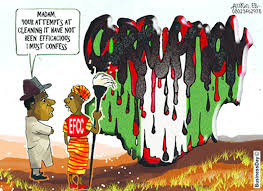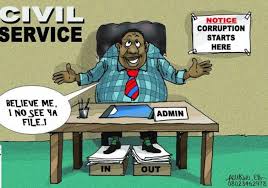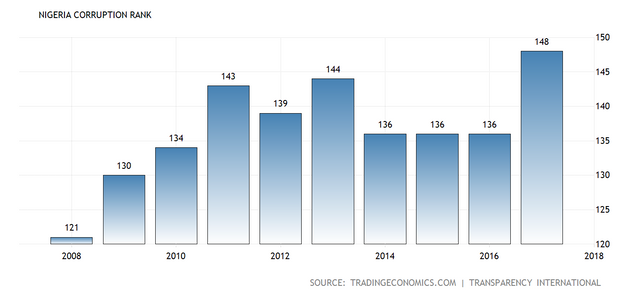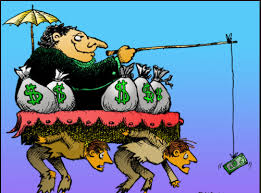CORRUPTION IN OUR GOVERNMENT/ POLITICAL SYSTEM (EPISODE #1)
.jpg)
Corruption is a form of dishonesty undertaken by a person entrusted with a position of authority, usually done to acquire personal benefit. Corruption may include many activities including bribery and embezzlement, sometimes it may also involve practices that are legal in some countries. Government, or 'political', corruption occurs when an office - holder or other governmental employee acts in an official capacity for personal gain. Corruption is most commonplace in kleptocracies , oligarchies , narco - states and mafia states.
.jpg)
Corruption in different sectors
Corruption can occur in any sector, whether public or private industry, even Non Governmental Organizations (NGOs), especially in public sector. However, only in democratically controlled institutions is there an interest of the public (owner) to develop internal mechanisms to fight active or passive corruption, whereas in private industry as well as in NGOs there is no public control. Therefore, the owners' investors' or sponsors' profits are largely decisive.
Sectors where corruption can take place are:
Government/public sector
Political Sector
Police sector
Judicial sector
Educational sector
Within labor unions
Etc.
In this part I will be talking about corruption in Government/public sector, Nigeria in particular.
.jpg)
Corruption in Government/public sector (part #1)
Political corruption is a persistent phenomenon in Nigeria. Corruption is potent cancer that has mercilessly eaten Nigeria to a state of stupor. It takes many shapes, starting with embezzlement, bribery, rituals, rigging in elections and so on. In fact, corruption is highest in the political system. In both the Senate and the House of Representatives, corruption is seen as normal. It is because of the “wicked level” of corruption that makes both the youths and the old struggle to find themselves in one political party or the other. They believe that once they occupy any position in politics, even the smallest, they will use corrupt tricks to fill their pockets with public funds.
The rise of public administration and the discovery of oil and natural gas are two major events seen to have led to increase in corruption practices in the country.
Nigeria the giant of Africa due to its natural mineral resources, is also the most populated country in Africa, has been ranked high in corruption by Transparency International and other notable organizations that monitor corrupt practices around the world. They do not to say anything good about Nigeria. High corruption rankings affect many Nigerians who migrate to foreign countries, as foreigners have the perception that since Nigeria is corrupt, so are all Nigerians.
In the year 2000, Transparency International carried out a survey on the corruption levels of 90 countries, including Kenya, Cameroon, Nigeria, Côte-d'Ivoire, Zimbabwe, Ethiopia, Ghana, Senegal, Zambia, India, and others. At the end of the ranking, Nigeria was found to be the most corrupt nation in that ranking because the country occupied the 90th position in terms of transparency. Nigeria was the most corrupt country in the year 2000.
In 2001, Nigeria was ranked the second-most corrupt nation in the world out of 91 countries, falling only to Bangladesh. This shows that corruption in Nigeria improved by one step when compared with that of year 2000.

Still from same source, in the year 2002, Nigeria has again ranked the second-most corrupt country in the world, after the organization surveyed 102 countries. Nigeria was seen at the bottom, occupying the 101st position in terms of Confidence Interval (CI).
In 2003, Nigeria received the same ranking, making no improvements from 2003.
Let me make reference of a corrupt Nigeria head of state who ruled from 1993 to 1998 during the military regime, his name was Gen. Sani Abacha.

According to the DOJ forfeiture, the assets returned to the Nigerian government represented proceeds of corruption during and after the military regime of General Abacha. The complaint alleges that General Abacha, his son Mohammed Sani Abacha , their associate Abubakar Atiku Bagudu and others embezzled, misappropriated and extorted billions of dollars from the government of Nigeria and others, then laundered their criminal proceeds through U.S. financial institutions and the purchase of bonds backed by the United States. As alleged in the complaint, General Abacha and others systematically embezzled billions of dollars in public funds from the
Central Bank of Nigeria under a false national security imperative. The complaint further alleged that Abacha and his conspirators withdrew the funds in cash and then moved the money overseas through U.S. financial institutions. General Abacha and his finance minister also allegedly caused the government of Nigeria to purchase Nigerian government bonds at vastly inflated prices from a company controlled by Bagudu and Mohammed Abacha, generating an illegal windfall of more than $282 million. In addition, General Abacha and his associates allegedly extorted more than $11 million from a French company and its Nigerian affiliate in connection with payments on government contracts. Funds involved in each of these schemes were allegedly laundered through the United States.
Causes of Corruption
There are many causes of corruption. Some causes are greed, poverty, and lack of moral values, economic insecurity, un-patriotism, and unusual desire for material wealth.
Effects Of Corruption in Government/Public Sector
Disregard for officials :
.jpg)
People start disregarding the official involved in corruption by talking negatively about him. But when they have work with him or her, they again approach them by a thought that the work is done if some monetary benefits are provided.
Disregard towards officials will also build distrust. Even lower grade officer will be disrespectful to higher grade officer. So even he may not obey his orders. There were even incidents where a lower grade police officer kidnapped higher grade officer for not offering him leave when asked.
Lack of respect for rulers:
Rulers of the nation like president or prime ministers lose respect among the public. Respect is main criteria in social life. People go for voting during election not only with the desire to improve their living standards by the election winner but also with respect for the leader. If the politicians involve in corruption, people knowing this will lose respect for them and will not like to cast their vote for such politicians.
Lack of faith and trust on the governments: People
vote to a ruler based on their faith in him/ her. But if found to be involved in corruption people lose faith in them and may not vote next time.
Lack of quality in services:
.jpg)
In a system with corruption there is no quality of service. To demand quality one might need to pay for it. This is seen in many areas like municipality, electricity, distribution of relief funds etc. If a person has to purchase a like medicine, due to corruption in education then the candidate after completion of his course will not like to provide quality health service if there is not enough remuneration for his service. Further candidates who do not have the ability can also get into the same seat by purchasing it. So though he becomes a medical practitioner, he may not be competent enough.
Ways to Tackle Corruption In Government/Public sector
The following are ways to tackle corruption in such sector. If you use them, you will see quick results.
Good Leaders in Government
To stop corruption, have good leaders in government. If leaders lead with conscience, their followers will copy their good qualities and behave well.
Make Political Positions Unattractive:
You must amend the constitution to make political appointments unattractive, if we want to tackle corruption in Nigeria.
We must reform the presidential system of government, and make it less flashy and the legislature part time.
Secondly, we should select Leaders who are ready to serve humbly, and make sacrifices.
Thirdly, the revenue mobilization and fiscal committee (RMAFC), should fix politicians pay, in line with the economic realities in Nigeria.
Finally, we should amend the requirements for contesting all leadership positions from councilor to president, to screen out morally unfit individuals who seek to lead solely for the benefits of office and as a means to wealth.
Payment to Collect Form by Candidates:
One more way to tackle corruption is to amend the constitution to make payment for expression of interest form to contest an election free.If parties demand millions of naira from members to collect forms to contest an election, where would young adults and academicians who desire to contest for office, get the money to not only buy form but also campaign for the position they seek.
Remember that he who pays the piper dictates the tune.
If things remain the way they are, it means that whenever a candidate wins an election and enters office, he is already indebted to those that financed his or her political contest.
To stop this form of political corruption, all parties must make collection of form to contest for political office free.
Donation and Campaign Funds of Political Parties:
The electoral body must probe all political party funds and restrict amounts parties can receive and what individual contestants, can use for their campaigns.
Secondly, political parties must disclose names of individuals who donate money to them and send list to the electoral body.
If the electoral bodies live up to their responsibilities, it will reduce corruption.
Provide for Independent Candidates in Our Constitution
Nigeria should imitate the United States of America where we borrowed the presidential system of government, to include a clause for independent candidate in the constitution.
Doing this will reduce role of godfathers and a situation where a leader after assuming office, is indebted to some people that sponsored his or her elections and must give them over inflated contracts, and make donations from public money.
Strengthen Government Agencies:
.jpg)
We should strengthen government agencies such as Economic and Financial Crimes Commission, Independent Corrupt Practices Commission and Code of Conduct Bureau, with the powers to tackle corruption.
To succeed they must be independent.
To make the institutions independent, amend the constitution to provide for the appointment and removal of their principal officers by an independent body, and not by the president.
Mount Campaign to Reorient Citizens
Government should mount campaigns to tell the people what corruption is, why they should run from it, how to report any corrupt public official and the reward for being a patriotic citizen.
If the campaigns continue and government officials do as they say, the attitude and behavior of many Nigerians will change for the better.
Conclusion
.jpg)
Citizens know the ways to tackle corruption in Nigeria but fail to change, because political leaders preach but refuse to do as they preach.
To tackle corruption, these four factors stand out; political leaders must lead by example, amending the constitution would help a great deal, you must punish offenders, and citizens can change if leaders change.
Sources: https://infoguidenigeria.com/tackle-corruption/
https://www.mindcontroversy.com/impact-effects-corruption-public-life-india/
Be ready to get other episodes on corruption from me.....
Feel free to drop your contributions